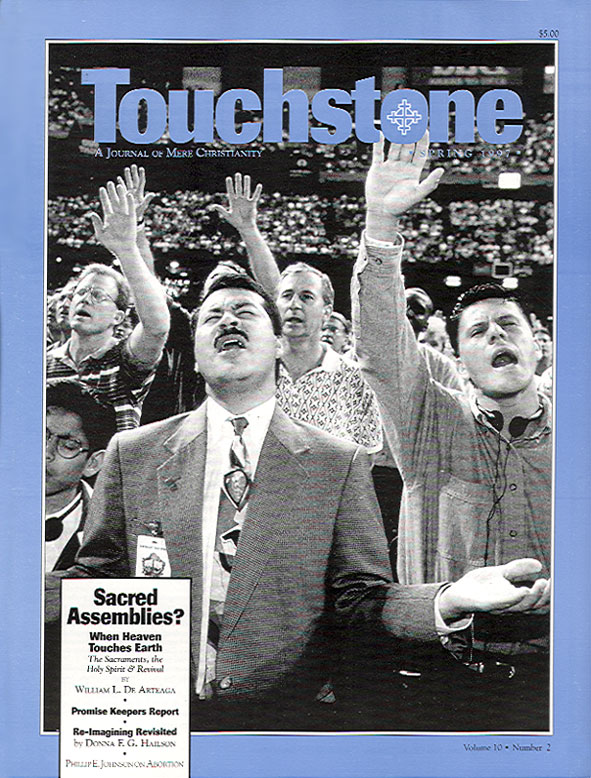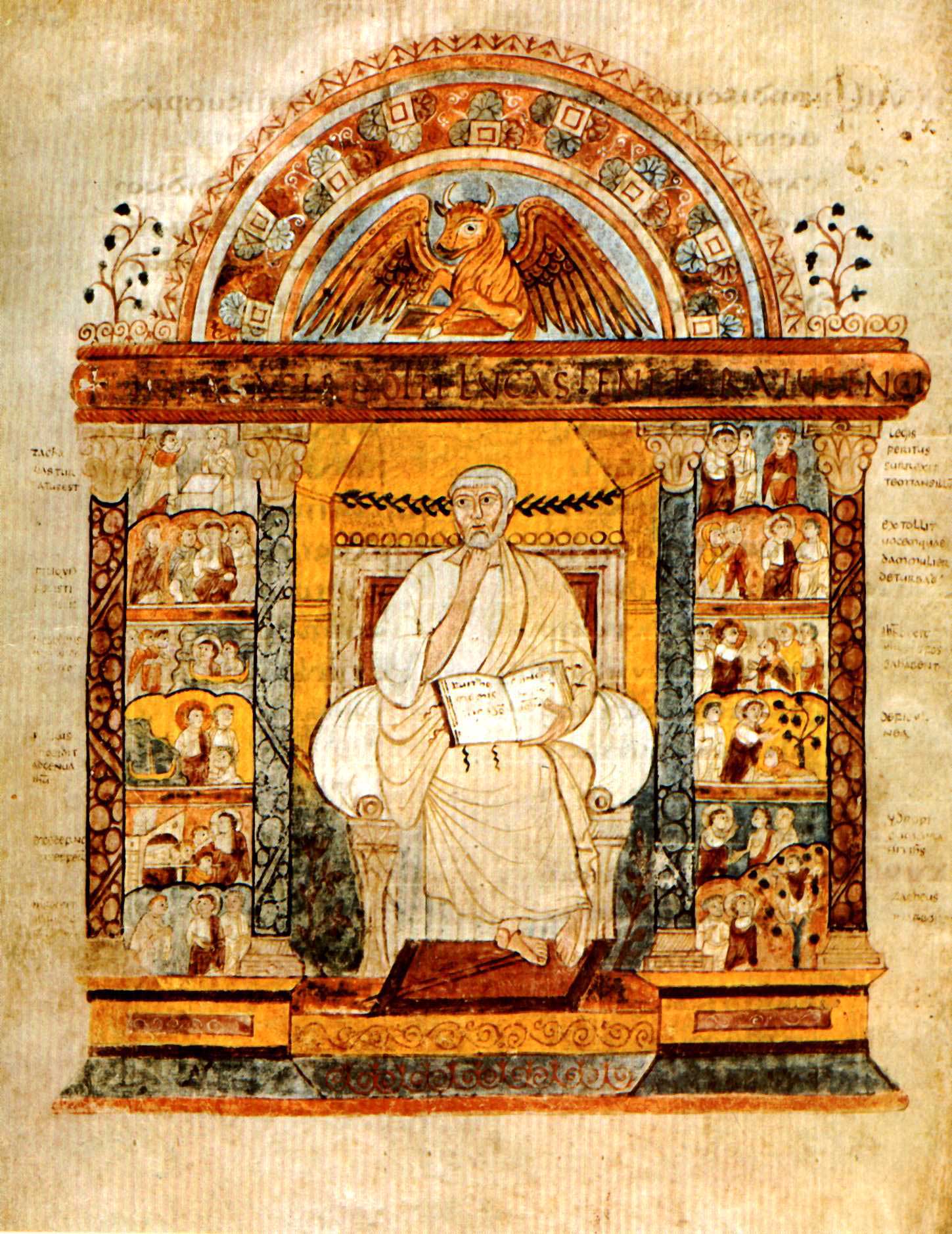Our Common Challenge
The concentration of mind which a man is supposed to achieve when he knows he will soon be hanged is relevant to the modern religious situation. Although evangelical Protestants, Eastern Orthodox, and Catholics hold quite varying beliefs, and are divided by fundamental disagreements, they share a growing sense of the precarious status of all faithful Christians in the modern world.
Despite their differences, Christians have often provided protection for one another, in that the very diversity of beliefs made it difficult for anti-religious skeptics to assault what appeared to be a many-fronted army. But an ironic result of the collapse of liberal Christianity is to make orthodoxy more vulnerable, as serious Christians are more and more defined as marginal, eccentric, even as dangerous to society.
Thus while Catholics may disagree with the biblical interpretations of some Protestants, they cannot help but notice how “Fundamentalism” has been demonized as the epitome of dangerous fanaticism, even as Protestants who reject papal authority must recognize how the media use dissident Catholics to undermine the very idea of religious orthodoxy. In familiar words, if serious Christians do not in some sense hang together, they will indeed be hanged separately by a world increasingly hostile to everything they represent.
A New Age of Unreason
The Western world is now experiencing the third of the three great cultural shifts which have profoundly affected the Christian faith. The first was the fall of the Roman Empire, as the result of which Christianity became the great formative force in the creation of a new civilization. The second was the Enlightenment, when for the first time in fifteen hundred years the spiritual authority of Christianity itself was seriously challenged.
This is, as the cultural commentators insist, the “post-modern age,” in which many of the dogmas of the Enlightenment (for they were indeed that, even though claiming to be based solely on reason) are being discredited, not excluding science itself, in certain ways. Yet the collapse of modernism has not helped Christianity as logically it should by once again revealing that there is more to reality than skeptical intelligence can grasp. Rather the irrationalism of the post-modern era has itself been turned against the Christian faith, so that Christians in the post-modern age suffer from the worst of both worlds—the new irrationalism and the remnants of the old rationalism.
The irrationalism of the post-modern mind places it beyond the possibility of fair-minded argument. Thus although feminists may claim to worship pagan goddesses, millions of people believe in astrology, and post-modern philosophers acknowledge that there are no compelling rational arguments for Enlightenment dogmas, Christianity can still be rejected as irrational. To charge its critics with inconsistency is merely to bring the response that logical coherence is no longer applicable. In the words of the leading post-modernist philosopher Richard Rorty, “truth is what your colleagues will let you get away with saying.” (It is perhaps not coincidental that Rorty is the grandson of the leading liberal theologian Walter Rauschenbusch.)
Through most of the modern period Christian apologists attempted to meet intellectual objections to their faith, assuming that intellectual errors are at the root of unbelief. But the irrational rebellion of the unfettered human self has always been the real root of disbelief, and it remains unaffected by rational argument. During much of the modern period this irrationalism had to be denied or concealed, but naked assertions of the self now enjoy intellectual respectability and are also the working personal philosophy of countless people who have never so much as opened a philosophy book.
It is thus significant that the post-modern era has to a great extent discredited classical atheism, because the latter phenomenon rests on an idea of objective truth. Atheism now appears to post-modernists as too narrow, as in a sense conceding too much to believers in allowing them to appropriate divinity for themselves.
The Spiritual Jungle
Instead Western culture is now a religious tropical jungle, in which every kind of “spiritual” movement flourishes and gains respectability, roughly in proportion to the degree that it departs from classical Christianity. In this environment to call oneself an atheist is to admit to personal spiritual impoverishment. The approved post-modernist attitude is to affirm spiritual reality everywhere in the universe and to hone oneself into an especially sensitive instrument for detecting it.
For centuries the First Commandment seemed to most Western Christians almost an irrelevancy, at best understood metaphorically (the ”worship” of money, for example). But the threat to Christianity now is not atheism but, as it was at the time of Christianity’s founding, polytheism, which is almost inescapable in post-modern culture.
While there are literal Western polytheists who have willed themselves into a kind of pre-Enlightenment naiveté, for the most part the new polytheists profess that creed because they regard “god” as no more than an appealing idea. Man makes god in his own image and can therefore make any kind of god, or gods, he wishes. (On this point a bow to feminist dogma may be justified—woman may make any god, or gods, she wishes.) Divinity is an emanation from the self, and thus religious orthodoxy is the ultimate heresy, because it acknowledges a divine reality outside the self.
Christianity is therefore accused of restricting access to God, finding him primarily in the Scriptures, in the Church, in holy places, in acts of formal worship, when in fact he (they) are everywhere. There is of course an orthodox understanding of this—God created the universe and is present everywhere in his creation. But it is precisely the “narrowness” of the Christian understanding which is required now, to protect against an undifferentiated pantheism.
As the central mystery of their faith, the Trinity is the reality to which Christians must return again and again. Although the dogma may seem arcane, one of the practical purposes it serves is to reveal the radical strangeness of God, in human terms. Left to themselves human beings have usually been polytheists, while monotheism has occurred to a few philosophically inclined speculators. But a God who is both one and three defies human understanding, serving as a barrier against both polytheism and Deism.
Seldom noticed is the way in which modern science undercuts the cozy, largely subjective sense of divinity dear to so many contemporary Christians. As a physicist has said, not only is the universe a very queer place, it is much queerer than we can even imagine. A universe of quarks, black holes, and infinite expansion is not easily reconciled with cozy images of an intimate God serving mainly for the gratification of the self. However the universe is understood, taking science seriously requires a spirit of objectivity, of humble submission to an infinitely complex reality finally lying beyond the human ability to comprehend. (Not coincidentally, the post-modernist spirit is often anti-scientific.)
By now the sociological patterns of belief in modern culture are too obvious to require rehearsal. Liberal religion, which deliberately modifies itself in each generation to make itself more credible to the age, steadily loses credibility, as it merely reveals its intellectual and spiritual bankruptcy. Its success is merely in persuading people that they do not need religion at all, or at least do not need to be Christians, since the universe is teeming with “meaning.” The logic of liberal Christianity already requires it to abandon its unique loyalty to Jesus Christ. Conversely “conservative” Christianity continues to grow, partly because it attracts those disillusioned with the liberal churches to which they once belonged but also because the spiritual searchings of the culture do impel some people towards authentic belief.
Personal Evangelism
But even the most sincere people in a post-modernist culture often do not place great weight on rational arguments, valid and important though those arguments may be in themselves. Almost everything is filtered through the mechanism of personal, subjective relevance. And consequently it is in those terms that Christians must attempt to propagate their faith. (In the Jewish world where Christian proselytization began there was of course a similar lack of interest in abstract argument and consequently a similarly personal and direct kind of evangelization.)
For three centuries the Enlightenment claimed to offer secular salvation, promising that by following reason human beings would not only come to know the truth but could thereby build for themselves a perfect world. In the post-modern era few people any longer believe this, and most people recognize that every kind of “progress” proves to be at best ambiguous, often bringing with it unforeseen negative consequences. The very subjectivity of the culture makes people less willing to accept a pragmatically functional society—prosperous, well-ordered, comfortable—as the end of existence. They continually seek “more,” both for narrowly selfish and authentically religious reasons.
The movement called Neo-conservatism is primarily a political phenomenon, but part of its conservatism is precisely that it recognizes how many political problems are at root spiritual. However, Neo-conservatism poses for its adherents a seemingly insoluble dilemma—virtually all of them are themselves thorough products of Enlightenment liberalism, and few seem to have a personal religious faith. They recognize the bankruptcy of the Enlightenment, in that reason alone cannot save civilization, but they find it impossible themselves to espouse any transcendent faith.
What is required is what has occurred at each great past juncture of history—a major religious explosion which creates the spiritual basis for a new civilization. Neo-conservatives are thus caught in the unhappy situation of seeing that a religious revival is necessary but being unable to suggest how one might come about.
Arguing exclusively from history, in the manner of Arnold Toynbee, it might seem that the spiritual bankruptcy of Western civilization itself sounds the death knell for Christianity, since history seems to show that the end of every civilization is followed by the emergence of a major new religion which creates the spiritual basis for a new civilization. Christianity’s claim to eternal truth, and particularly its faith in the power of Christ’s resurrection, are thus being tested in terms of whether an existing, ancient religion can infuse new vitality into the culture.
In principle the need for redemption, as an acutely felt, highly personal thing, is stronger now among more people than perhaps it has been for a long time, even if many of those people do not even know what it is which they seek. Thus it is here that Christians, in their varying ways, must begin the effort to transform the larger culture.
—James Hitchcock
This editorial is from a talk at “Not of This World: A Gathering of Traditional Christians,” Rose Hill College, May 1995.
James Hitchcock is Professor emeritus of History at St. Louis University in St. Louis. He and his late wife Helen have four daughters. His most recent book is the two-volume work, The Supreme Court and Religion in American Life (Princeton University Press, 2004). He is a senior editor of Touchstone.
subscription options
Order
Print/Online Subscription

Get six issues (one year) of Touchstone PLUS full online access including pdf downloads for only $39.95. That's only $3.34 per month!
Order
Online Only
Subscription

Get a one-year full-access subscription to the Touchstone online archives for only $19.95. That's only $1.66 per month!
bulk subscriptions
Order Touchstone subscriptions in bulk and save $10 per sub! Each subscription includes 6 issues of Touchstone plus full online access to touchstonemag.com—including archives, videos, and pdf downloads of recent issues for only $29.95 each! Great for churches or study groups.
Transactions will be processed on a secure server.
more from the online archives
calling all readers
Please Donate
"There are magazines worth reading but few worth saving . . . Touchstone is just such a magazine."
—Alice von Hildebrand
"Here we do not concede one square millimeter of territory to falsehood, folly, contemporary sentimentality, or fashion. We speak the truth, and let God be our judge. . . . Touchstone is the one committedly Christian conservative journal."
—Anthony Esolen, Touchstone senior editor









